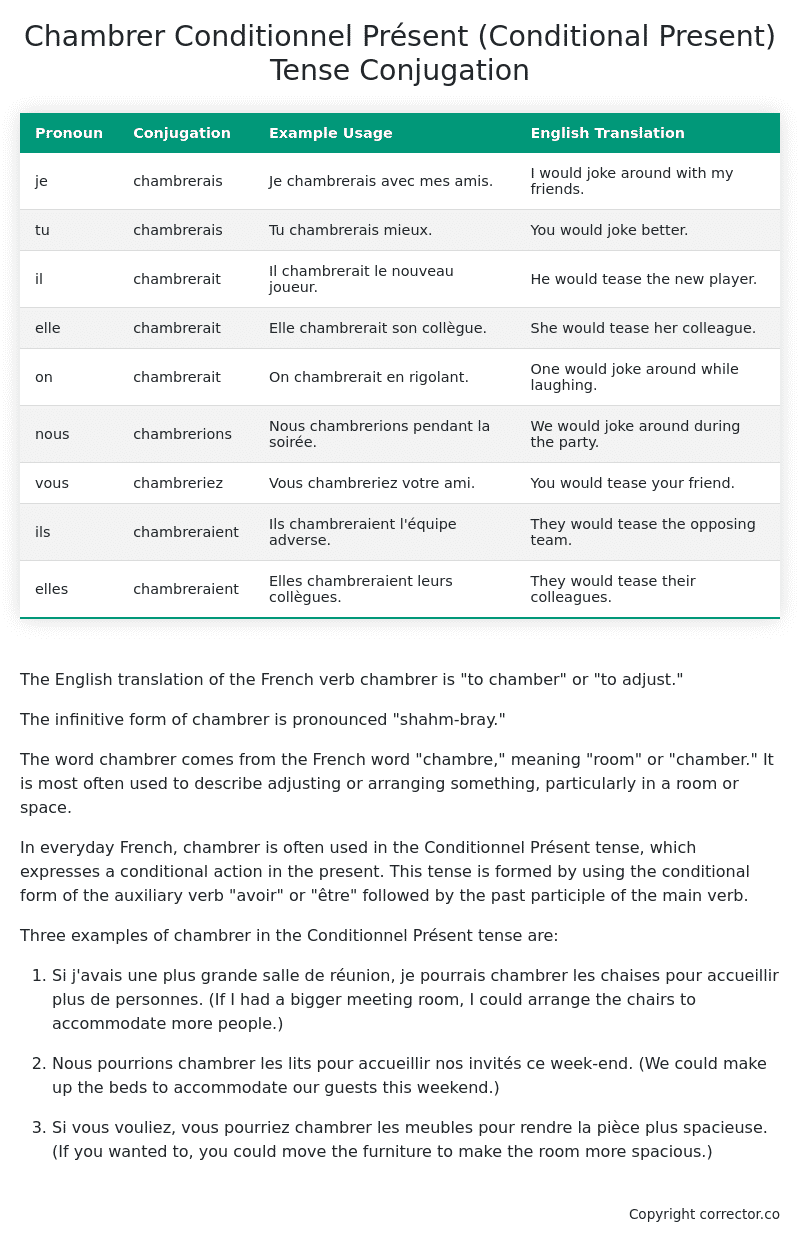Conditionnel Présent (Conditional Present) Tense Conjugation of the French Verb chambrer
Introduction to the verb chambrer
The English translation of the French verb chambrer is “to chamber” or “to adjust.”
The infinitive form of chambrer is pronounced “shahm-bray.”
The word chambrer comes from the French word “chambre,” meaning “room” or “chamber.” It is most often used to describe adjusting or arranging something, particularly in a room or space.
In everyday French, chambrer is often used in the Conditionnel Présent tense, which expresses a conditional action in the present. This tense is formed by using the conditional form of the auxiliary verb “avoir” or “être” followed by the past participle of the main verb.
Three examples of chambrer in the Conditionnel Présent tense are:
-
Si j’avais une plus grande salle de réunion, je pourrais chambrer les chaises pour accueillir plus de personnes. (If I had a bigger meeting room, I could arrange the chairs to accommodate more people.)
-
Nous pourrions chambrer les lits pour accueillir nos invités ce week-end. (We could make up the beds to accommodate our guests this weekend.)
-
Si vous vouliez, vous pourriez chambrer les meubles pour rendre la pièce plus spacieuse. (If you wanted to, you could move the furniture to make the room more spacious.)
Table of the Conditionnel Présent (Conditional Present) Tense Conjugation of chambrer
| Pronoun | Conjugation | Example Usage | English Translation |
|---|---|---|---|
| je | chambrerais | Je chambrerais avec mes amis. | I would joke around with my friends. |
| tu | chambrerais | Tu chambrerais mieux. | You would joke better. |
| il | chambrerait | Il chambrerait le nouveau joueur. | He would tease the new player. |
| elle | chambrerait | Elle chambrerait son collègue. | She would tease her colleague. |
| on | chambrerait | On chambrerait en rigolant. | One would joke around while laughing. |
| nous | chambrerions | Nous chambrerions pendant la soirée. | We would joke around during the party. |
| vous | chambreriez | Vous chambreriez votre ami. | You would tease your friend. |
| ils | chambreraient | Ils chambreraient l’équipe adverse. | They would tease the opposing team. |
| elles | chambreraient | Elles chambreraient leurs collègues. | They would tease their colleagues. |
Other Conjugations for Chambrer.
Le Present (Present Tense) Conjugation of the French Verb chambrer
Imparfait (Imperfect) Tense Conjugation of the French Verb chambrer
Passé Simple (Simple Past) Tense Conjugation of the French Verb chambrer
Passé Composé (Present Perfect) Tense Conjugation of the French Verb chambrer
Futur Simple (Simple Future) Tense Conjugation of the French Verb chambrer
Futur Proche (Near Future) Tense Conjugation of the French Verb chambrer
Plus-que-parfait (Pluperfect) Tense Conjugation of the French Verb chambrer
Passé Antérieur (Past Anterior) Tense Conjugation of the French Verb chambrer
Futur Antérieur (Future Anterior) Tense Conjugation of the French Verb chambrer
Subjonctif Présent (Subjunctive Present) Tense Conjugation of the French Verb chambrer
Subjonctif Passé (Subjunctive Past) Tense Conjugation of the French Verb chambrer
Subjonctif Imparfait (Subjunctive Imperfect) Tense Conjugation of the French Verb chambrer
Subjonctif Plus-que-parfait (Subjunctive Pluperfect) Tense Conjugation of the French Verb chambrer
Conditionnel Présent (Conditional Present) Tense Conjugation of the French Verb chambrer (this article)
Conditionnel Passé (Conditional Past) Tense Conjugation of the French Verb chambrer
L’impératif Présent (Imperative Present) Tense Conjugation of the French Verb chambrer
L’infinitif Présent (Infinitive Present) Tense Conjugation of the French Verb chambrer
Struggling with French verbs or the language in general? Why not use our free French Grammar Checker – no registration required!
Get a FREE Download Study Sheet of this Conjugation 🔥
Simply right click the image below, click “save image” and get your free reference for the chambrer Conditionnel Présent tense conjugation!

Chambrer – About the French Conditionnel Présent (Conditional Present) Tense
Formation
Common Everyday Usage Patterns
Expressing Polite Requests
Expressing Hypothetical Situations
Expressing Doubt or Uncertainty
Interactions with Other Tenses
Present Tense
Past Tense
Future Tense
Conditional Perfect
Summary
Want More?
I hope you enjoyed this article on the verb chambrer. Still in a learning mood? Check out another TOTALLY random French verb conjugation!


